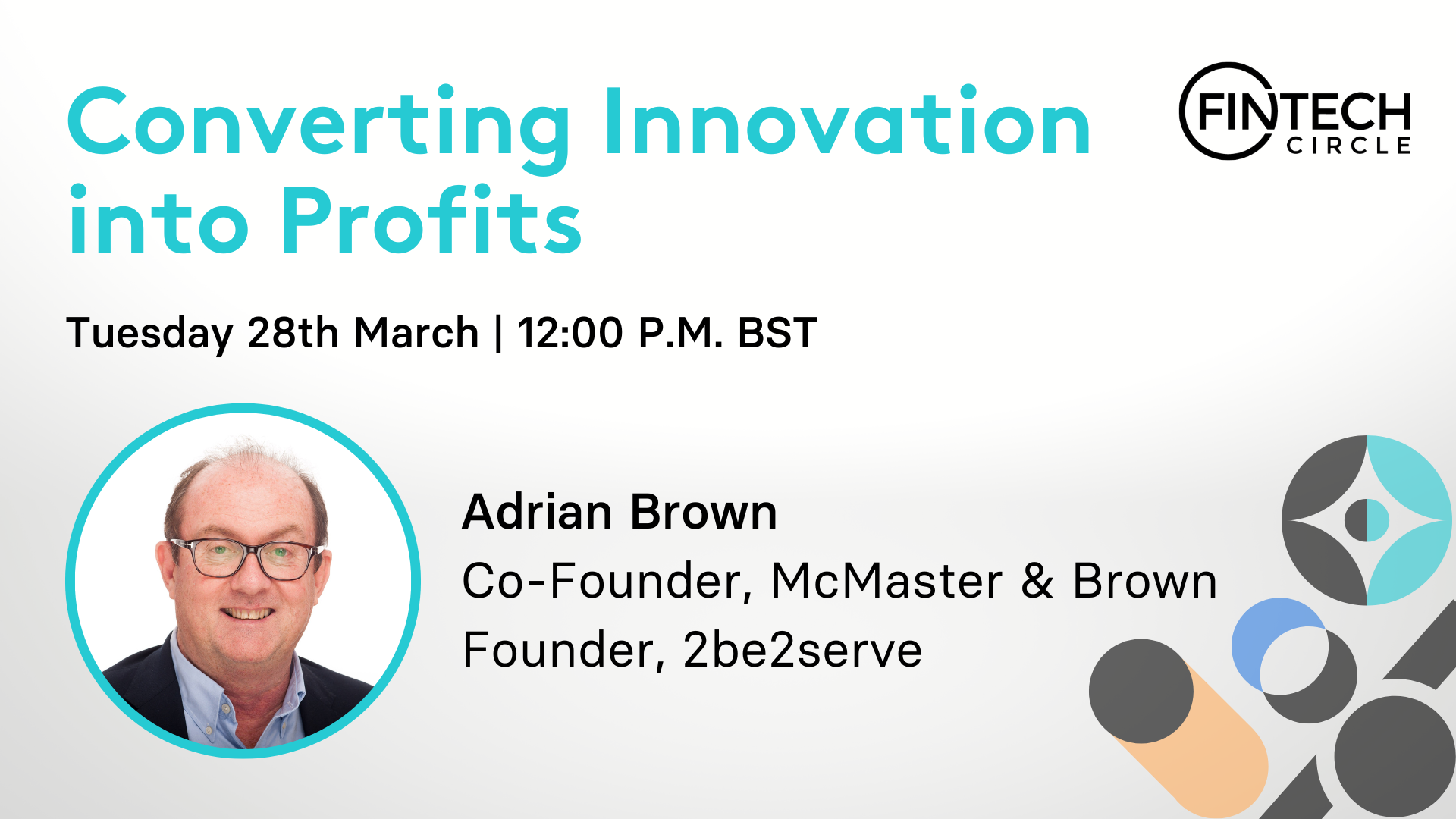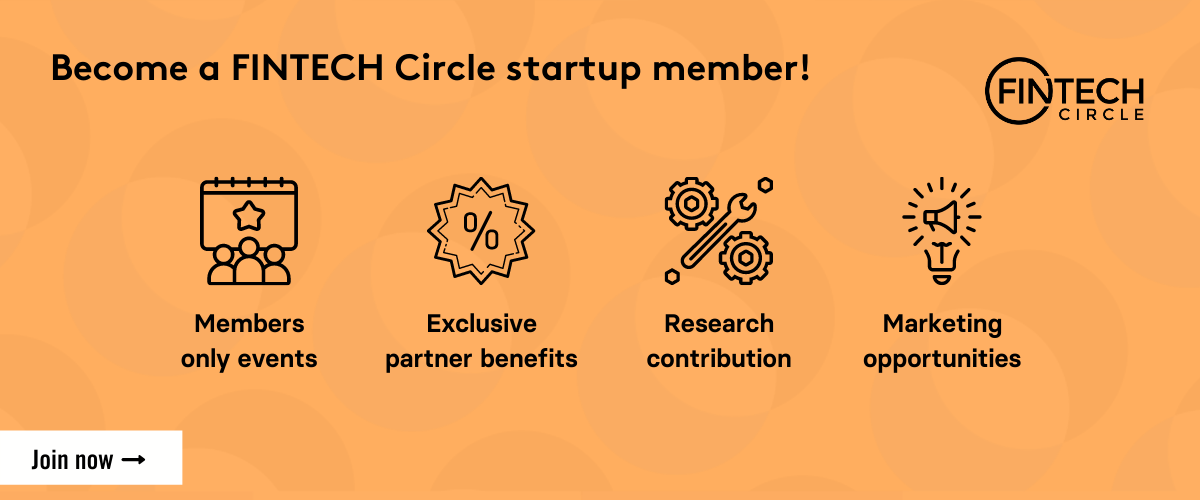Converting Innovation into Profits

Date: 03 April 2023
Author: FINTECH Circle
Innovation is a buzzword that is frequently used in the business world, but it is often misunderstood. Many people associate innovation with creating new products or services, but in reality, innovation is about creating new possibilities from what already exists. It’s about coming up with new ideas to solve problems, improve processes, and create new functionality.
In a recent webinar hosted by FINTECH Circle’s CMO, Glenn P Burgess, and guest speaker, Adrian Brown, titled “Converting Innovation into Profits”, the discussion was based on the challenges of innovation in the financial sector and how to create a culture of innovation that drives growth and profits. Here are some key takeaways from the webinar.
One of the first steps to creating a culture of innovation is to identify the obstacles that exist within an organization. These obstacles can vary from company to company, but some common ones include a lack of resources, fear of failure, and a rigid corporate culture. By identifying these obstacles, organizations can start to develop strategies to overcome them and create a more innovative environment.
Creating a Platform for Innovation
To encourage innovation, organizations need to create a platform for it to occur. This platform should be separate from the rest of the organization and have the freedom to experiment and create new ideas.
At the same time, it needs to have the right conditions to enable innovation to succeed. This includes having the right structures and principles in place, such as ethical and strategic principles, financial principles, and people development.
Platform technology is an important aspect of creating a platform for innovation. Every company has a core, which is the thing that makes the company what it is. This core is often linear and structured, which can make it difficult to innovate.
However, on the edge of the core, there is more flexibility and creativity, which is where innovation can occur. By creating a technology that enables new ideas to come in while protecting the core, organizations can encourage innovation without risking the core of their business.
Managing Innovation and Change
The challenge for managers is how to manage an environment that is rigid and inflexible at the core, while at the same time encouraging innovation and creativity at the edge. The key is to manage the flow of knowledge and information between the edge and the core, so that the core is always being adapted with new ideas and thinking, without damaging the business.
Managers must also learn to communicate effectively and hold challenging conversations with their team members to encourage adaptability and continuous improvement.
The Role of Culture in Innovation
The real obstacle to innovation in the financial industry is culture, not technology. The culture of the industry must change to adapt to new technologies and foster a collaborative environment between fintech and traditional banking.
This requires effective leadership and management for the purpose of change, where relationships are based on a specific purpose and dynamic, creating the right conditions for new cultures to emerge.
The Culture of Management
The default for management is control, and the default for management is to stop things happening and keep things in check. We need to move away from that and move towards management for change.
Leadership culture needs to change to allow that to happen, and we need relationships for change, not relationships for keeping things as they are. We need to learn a new language that controls how we think, and our language has to become a language for change. We also need to learn how to communicate for change.
The Benefits of Innovative Culture
Creating an innovative culture in your organization protects the core and adapts it with new ideas and new thinking, allowing the business to grow. People let go of the status quo and start working in a continually innovative way. The benefits of this are the speed of implementation and reducing the obstacles quickly.
Collaborative working environments can emerge, reducing turf wars over where the future lies. It can increase the time for innovation, and management and leadership will be there to support it. From an investor’s point of view, the environment has to get better because they will see their investments grow.
Challenges of Integrating Fintech and Banking
Integrating fintech and banking is challenging because the two industries have different cultures, processes, and regulatory environments. Fintech companies are typically startups that prioritize innovation and customer experience, while banks are established institutions that prioritize stability and risk management.
These differences can make it difficult for banks to adapt to new technology and for fintech companies to navigate the complex regulatory landscape of the financial industry.
One of the most significant challenges of integrating fintech and banking is the issue of data ownership. Banks have traditionally been the custodians of customer data, but with the rise of fintech companies, customers are increasingly willing to share their data with third-party providers. This has led to concerns about data security and privacy, and banks are reluctant to share their data with fintech companies.
Another challenge is the regulatory environment. The financial industry is heavily regulated, and banks are subject to strict compliance requirements. Fintech companies, on the other hand, are more agile and able to move quickly, but they may not have the resources or expertise to navigate the complex regulatory landscape.
As a result, there is a risk that fintech companies may inadvertently violate regulations, leading to fines or legal action.
Creating an Innovative Culture with Platform Technology
Creating an innovative culture within a financial institution is critical to success in today’s fast-paced, constantly changing business environment. Platform technology can enable this by creating an environment that encourages innovation, creativity, and collaboration.
At the core of every company is a set of processes that defines its core business. These processes are usually rigid and linear, making it challenging to innovate and adapt to change. However, at the edge of these processes, the boundaries are fuzzy, and the rules are more flexible, creating an environment that encourages innovation and creativity.
The challenge for managers is to create an environment that encourages innovation at the edge while protecting the core business. One way to do this is through effective management and leadership that manages the flow of knowledge and information between the edge and the core.
By creating a hybrid space that allows new ideas to come in while protecting the core business, managers can create an environment that encourages innovation and creativity. To enable this, managers need to move away from the default position of control and instead embrace management for change.
Finally, the outcome of an innovative culture is significant. It can help organizations to stay relevant and competitive in the ever-evolving market, reduce the time for innovation, and improve collaboration among competitors, and create new opportunities for growth.
Moreover, an innovative culture can increase the speed of implementation, reduce internal conflicts, and enhance the overall customer experience. All of these can lead to better business performance and higher returns for investors.
Conclusion
Innovation is essential for businesses to stay relevant and competitive, but managing it effectively is crucial. Platform technology, effective management and leadership, and a culture of collaboration are all key components of successfully integrating innovation into a business. With the right approach and mindset, innovation can be converted into profits and ensure a company’s longevity in the marketplace.
About Adrian Brown

Adrian Brown is a successful entrepreneur and business consultant. Over the years, Adrian has built a reputation as a skilled business leader, having founded and grown several businesses to great success. Like many successful businesspeople, Adrian’s journey to success was not without its challenges, but he believes that the key to success is to learn from one’s failures and mistakes.
Adrian believes that every business is unique and requires a customized approach to achieve success. He has developed a proprietary approach to leadership that he calls Clean Leadership®, which emphasizes the importance of creating an environment that nurtures and continually innovates for the uniqueness of each business. Drawing on his extensive experience in coaching, mentoring, and consulting, Adrian helps business owners overcome challenges and obstacles that might otherwise hold them back. He helps create a unique working environment that supports strategic goals and aspirations, which he believes is essential for long-term success.
Adrian understands that businesses today face different challenges than in the past, and he believes that to remain viable, businesses must adapt to the changing market. He emphasizes the importance of creating a working environment that supports a culture based on contribution and collaboration. He believes that traditional linear command and control leadership cannot succeed in the new paradigm and that businesses need Clean Leadership® to nurture, inspire, challenge, and empower their entire workforce to achieve peak performance.
In his work, Adrian focuses on transformation, leadership, behavior, purpose, community, and customer experience. He helps business owners create a unique and supportive working environment that allows them to achieve their goals and aspirations. With Adrian’s guidance, business owners can transform their organizations, become effective leaders, and create a culture of contribution and collaboration that will lead to long-term success.
About Glenn P Burgess
 Glenn P Burgess is UK’s No1 fintech and SaaS marketing expert. With multiple multimillion launches under his belt – and a stables of Global No1’s, he now is an International Speaker, invests in startups, mentors and coaches SaaS owners and teaches at both Google Campus and Ilia State University, Georgia.
Glenn P Burgess is UK’s No1 fintech and SaaS marketing expert. With multiple multimillion launches under his belt – and a stables of Global No1’s, he now is an International Speaker, invests in startups, mentors and coaches SaaS owners and teaches at both Google Campus and Ilia State University, Georgia.




